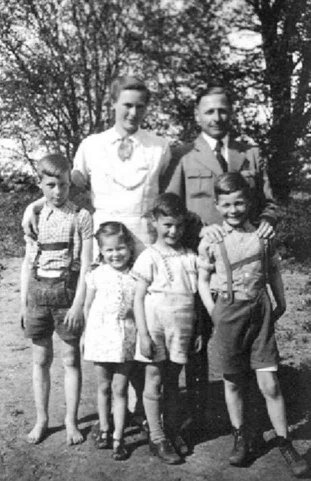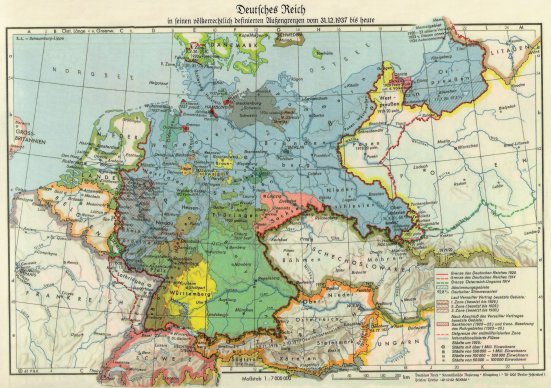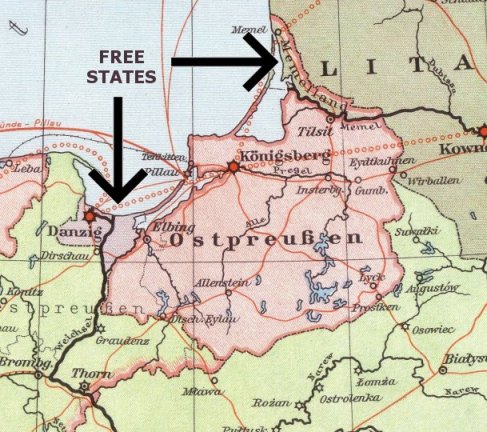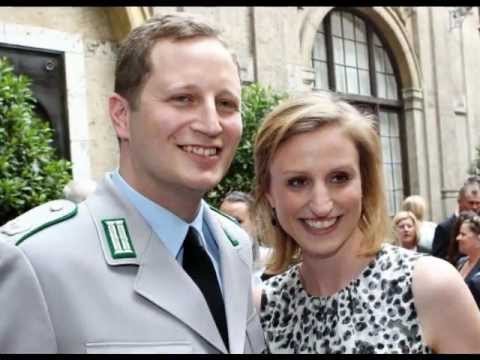
16. Restoring Prussia:
It Begins With People

We have mentioned in our online discussion group, from time to time, the importance of restoring Prussia. All of us want that though inevitably everyone will have a slightly vision of how that should be done. All agree that International Law must be applied and that Germany should be restored, at the very minimum, to its borders as they were in 1937 because the legal entity that is 'Germany' is still the Weimar Republic with its various free states including the Free State of Prussia. There were no 'Länder' back then, merely former kingdoms (Prussia, Saxony, Württemberg), principalities, etc., the larger of which (like Prussia) were subdivided into provinces (East Prussia/Ostpreußen, Pomerania/Pommern, Upper Silesia/Oberschlesien, Lower Silesia/Niederschlesien, Border Province Posen-West Prussia/Grenzmark Posen-Westpreußen, Brandenburg, Hannover, Schleswig-Holstein, Westphalia/Westfalen, Rhineland/Rheinland, Hessen-Nassau, Saxony/Sachsen, Hohenzollern, etc.).
 The Weimar Republic
The Weimar Republic
The Free State of Danzig would also have to be restored along with a Free State of Memelland which was illegally annexed by Lithuania in 1923. Though they should never have been detached from Prussia/Germany in the first place they are, according to International Law, Free States under what was then the League of Nations. Since that organisation is now defunct one assumes they would become United Nations territories. Had plebiscites been conducted, as they should have been (because the Allies undertook to), they would have overwhelmingly voted for reincorporation into Prussia - beyond a shadow of a doubt.

There are a number of additional legal issues if we want to make it more complicated. Normally German's legal borders are defined per pro 1937 because the annexations of Austria, Sudetenland, Bohemia-Moravia (illegal) and Memelland took place between 1938 and the outbreak of war in 1939. Though the annexation of Bohemia-Moravia as a Reichs Protectorate was definitely illegal, as well as morally unjustified, the incorporation of the other territories was without a doubt the will of the people involved. Though others would disagree, no doubt, the Memelland and Sudetenland ought also to be regarded as legally a part of Germany. German Austria (Deutsch Österreich) wished to unite with Germany after 1918 but were forbidden from doing so by the Allies. Whether modern Austria would wish to be a part of a modern Germany would have to be determined afresh. Somehow I doubt there is any interest in that anymore.
We are, in any case, primarily interested in Prussia and so the Prussian territories outside Weimar Germany in 1937 - Danzig and Memelland - are what primarily interest us. The rest of West Prussia (Westpreußen) outside the Grenzmark and post-1923 East Prussia (Ostpreußen), and the German parts of Posen (Poznan) are moral questions and beyond the scope of any discussion on legalities.
I have long maintained that the return of the Oder-Neiße territories is totally unrealistic in the present world order. For it to happen a whole legal Pandora's Box would have to be opened which the dominant world powers - Russia, the USA, the UK and France in particular - have no interest in doing. Not Russia, because it would mean losing the Kaliningrad (Königsberg) Oblast, which is of immense strategic significance geopolitically and militarily, and not the USA/UK/France because the modern Federal Republic of Germany (Bundesrepublik Deutschland) is an illegal state owned as a Corporation by the USA/UK/France Consortium (Russia, then the USSR, sold out its share - the German Democratic Republic or Deutsche Demokratische Republik) at 'Reunification',so-called). And the political, economic, and military-industrial élites in the 'Federal Republic' would not wish to change the status quo because it would mean a loss of power for them too. We must not forget that Poland would be vehemently opposed, for obvious reasons. Without a complete breakdown in Europe with possibly war too, a return of the Eastern Territories will never happen, in whole or in part. At one time I regarded the return of Kaliningrad/Königsberg as the only realistic possibility but with the rise of Russia as a major power under Putin, that seems very unlikely to me too now.
Though we want the Eastern Territories returned, none of us wants war. There's another major problem: even if Germany should have these territories returned, what then? The Poles aren't going to want to leave. To where would they go? The original generation of Prussian Germans expelled from these territories has all but gone and likewise the first generation of Polish settlers. Morally, can we expect the children and grandchildren of those Polish colonists to leave? Then there are the Prussian expellees themselves. Their children and grandchildren are fully integrated into Western and Central ('Eastern') German life. Most have lost their former identities. There are organisations which preserve the culture and identity of the expellee generation but they are a tiny percentage of the whole. It's very unlikely that the descendents of the expellees would even want to return to their ancestral home. A handfull, no doubt. Whoever went back there, even assuming they were in sufficient numbers to repopulate these regions, would be culturall different from their forefathers. The local dialects would be gone along with the customs and traditions. These could be restored gradually over time through education but whatever resulted would be very different from what was before. The old Eastern Territories, culturally speaking, are well and truly dead. That's a painful fact we must accept.
The repatriation of Poles, Russian and Lithuanians from these territories presents insurmountable problems. Who would pay for all of this? Where could they be accommodated? What jobs and housing would be available for them? Such a transfer, if it is to be done in a humane and civilised manner, would take a very long time so as to preclude chaos and suffering. Such large population movements have never taken place historically in peace time. Why should we suppose it could suddenly be done now? If I were a Pole, I would resist with every fiber of my being. And you can't blame them. Nor can you make the generations not responsible for the original expulsions and murders responsible. It just wouldn't be ethical. However outrageously unjust the events of 1944-47 were, I do not think it is realistic to ever expect them to be undone. It is a fait accomplis, just as other historical expulsions or mass movements of people are. The Greeks are never going to return to the Turkish coastline (to Smyrna, for example). The Crimean Peninsular will never be Tartar again and the Russian colonists will never be removed on a voluntary basis. The same is true of the millions of Han Chinese colonists planted in Tibet, Sinkiang and elsewhere by Mao and his successors bent on eliminating minorities who might want to leave the People's Republic. The same is true of the Russians in the Baltic States and other former Soviet Republics. And Poland is not about to get its Eastern Territories back off the Ukraine (Lwów/Lemberg), Belarus (Pinsk) and Lithuania (Wilno/Vilnius), even assuming it had a legitimate ethnic right to them (which it doesn't since Poles were always a minority in Eastern Galicia, Volhynia and Wilno).
This is just reality...unless you are a tyrant-in-the-making wanting bloodshed and anarchy which here we absolutely are not. Yes, it is a painful reality but one we must accept. Any peaceful, voluntary rearrangement of territories and populations will not be accomplished until there is a new Master of this world, a King of Peace. (See, Will the Prussian East be Regained?)
What, then, are we to do? Is Prussia a lost cause? By no means. We just have to remember what Prussia is and what it is not. Prussia is not an ethnicity, even though Germans dominated the ethnic groups. If you want Prussia back in anything resembling its scope in the past, you are going to have to welcome other nationalities who are willing to embrace the culture and German language. That is not impossible. I know of Russians in the Kaliningrad enclave who are very drawn to the Prussian ways. Some might want to stay in a restored East Prussia and assimilate. Should we welcome them? If we believe in Prussia's values, absolutely. All would intermarry and enrich the stock. They wouldn't be the original Prussians, of course. They would be 'New Prussians'. Is such an unlikelihood? Not a bit. The Slavic Masurians voted en masse to remain Prussian and German because they loved the culture. They were not a bit interested in the new Polish Republic after World War 1. Though many remained behind in the new Communist Poland in 1945, the remainder went west with their ethincally German Prussian comrades. Such loyalties, if won peacefully, can be very powerful. Look at the Slavic Sorbs of Lausatia (Lausitz) in modern Brandenburg and Saxony (Sachsen). They have their traditions but they are assimilated Germans. The Schlonzaks of Upper Silesia (Oberschlesien) do not regard themselves as either Poles or Germans. Given autonomy in a reunited Prussia, as the Alsace-Lorrainers were in Imperial Germany, and I am sure they would become willing Prussians. The Slavic Kashubians of West Prussia (Westpreußen) might be similarly persuaded. All this is possible on the basis of non-compulsion.
I very much believe in the maxim that nothing is settled permanently unless settled amicably. In the matter of the Eastern Territories, there would have to be some sort of give-and-take. It might even require a Prussia independent of a German state to make other ethnic groups feel equal partners. It could be done, with good will.
Even in the existing territorial boundaries, much can be done in restoring Prussia but what is first needed is not political but social, moral, ethical and spiritual. Prussia was always, first and foremost, an idea (see my article, Prussianism: A Lifestyle, An Instinct, A Compulsion). The Prussia that interests me personally is the one rooted in Christianity, the Enlightenment and in robust values generally. Prussia need not be a religious state, and probably never would become one, as it was always very tolerant of different beliefs. So we have to first of all ask ourselves, "What is a Prussian?" Then we have to distill out all the core values of Prussianism which the vast majority could accept and live by. It would need to include the core values of Christianity (primarily Lutheran, Reformed and Catholic), Judaism, classical liberalism, etc. so that religious and non-religious people alike could live by them. These I earlier called the Attributes of the Prussian Soul which by one reckoning are as follows:
- 1. Sincerity
- 2. Humility
- 3. Industriousness
- 4. Obedience (but not without Frankness)
- 5. Straightness
- 6. Sense of Justice
- 7. Godliness coupled with religious Tolerance
- 8. Toughness, against oneself even more than against others
- 9. Courage
- 10. Sense of Order
- 11. Sense of Duty
- 12. Probity
- 13. Self denial
- 14. Austerity
- 15. Bravery without sniveling
- 16. Loyalty
- 17. Incorruptibility
- 18. Subordination
- 19. Self-effacement
- 20. Reliability
- 21. Punctuality
Sadly, most of these values have been wiped out in the liberal Germany of today. What is needed, then, is a Prussian Social Reform Movement whose values are enshrined in these principles. The restoration of Prussia has to start with people, with each individual, committing to work towards these values in community. It could begin in what's left of the old Prussian territories, like Berlin, Brandenburg and Vorpommern (though admittedly Berlin has always tended toward the radical left). It would probably have to start in the hamlets, villages and towns. And it would take time, as all good things that last do. The Restoration of Prussia has to be organic, starting again from humble roots.
Whether the old monarchy could play I rôle in that, I do not know. A head, like Georg Friedrich, Prince of Prussia (assuming he would even be willing), is a consideration, though once you bring aristocrats into the picture, they will all start wanting a rôle. Personally, I think something along the lines of the Weimar Republic, minus some of the excessively liberal laws which plunged Germany into moral anarchy, making it In the cities at least) a den of iniquity, and plus possibly a symbolic figurehead like Georg Friedrich, would be the best solution.
 Prince Georg Friedrich of Prussia
Prince Georg Friedrich of Prussia
But that is a discussion all in itself, and there is never any end to political wrangling. What needs to be done is that which is practical along the lines which I have suggested.
It may never happen. Sufficient numbers may not be interested. Nevertheless, history turns on small hinges, as we all know, and provided there is a core of committed, dedicated believers in the 21 Points listed above (or something like them), who can have an impact on society by their example, something can happen.
Created 11.12.2018 | 11.12.2018
Copyright © 2018 SBSK Preussens Gloria
Alle Recht vorbehalten - All Rights Reserved


